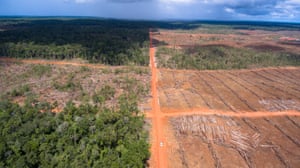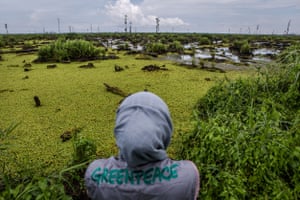HSBC triggers investigation into palm oil company over deforestation allegations | Guardian Sustainable Business
HSBC has triggered an investigation into Noble Plantations following allegations the company was preparing to clear thousands of hectares of rainforest in Papua for oil palm cultivation.
In a decision hailed as a first by a major bank, HSBC has asked the Roundtable on Sustainable Palm Oil (RSPO), a sustainability body for the palm oil industry, to investigate the claims.
The move follows pressure from campaigning organisations Environmental Investigation Agency (EIA) and Greenpeace, which last month wrote to four banks linked to a new $750m (£580m) bond issued by commodities giant Noble Group.
The NGOs asked HSBC, ABN Amro, ING and Rabobank to take action on allegations that Noble Group’s subsidiary, Noble Plantations, was gearing up to clear 18,000 hectares of pristine rainforest in Papua.
None of the banks made a formal complaint, according to Greenpeace, but HSBC did pass the documents on to the RSPO, which instigated the probe into Noble Plantations. While declining to comment on specifics, a spokesman for HSBC said the bank “is keen to ensure that the RSPO’s standards are observed and that any credible allegations of non-compliance are investigatedâ€.
Palm oil, which is a common ingredient in a huge number of consumer products, is an important driver of deforestation. Palm plantations cover an estimated 27m hectares of land worldwide and oil palm was responsible for an average of 270,000 hectares of forest loss a year from 2000-2011, according to one study.
“Given the seriousness of the allegations and supporting documentation,†said an RSPO spokeswoman, “the RSPO has advised the company to stop all further development on the concession pending full independent investigations and assessment by RSPO, and possible referral to its complaints panel.â€
A spokeswoman for Noble would only refer to the company’s sustainability document (pdf), which states that work on its plantations in Papua is on hold pending “additional sustainability analysisâ€.

Campaigners say banks have traditionally lagged behind companies when it comes to supporting ethical palm oil practices. But Greenpeace says HSBC’s move is the first public evidence that the bank is taking its palm oil policy seriously. “After years of turning a blind eye, the financial sector is finally starting to take a tougher line on rogue palm oil companies,†said Jamie Woolley of Greenpeace UK.
HSBC was recently the subject of Greenpeace’s “Dirty Bankers†report, which accused the bank of providing funding to palm oil companies complicit in environmental destruction.
In response HSBC announced a stricter lending policy based on a “no deforestation, no peat, no exploitation†commitment. While saying the bank’s policies show it has “no interest in financing illegal operations,†HSBC Group CEO Stuart Gulliver admitted “the financial sector can play a greater roleâ€.
Audrey Versteegen of EIA agrees: “Banks could do so much more, it’s frustrating to see that they don’t,†she says. While she called HSBC the “most progressive bank out thereâ€, she criticised its decision not to make a formal complaint to the RSPO, urging it to act more assertively when it comes to the negative social and environmental impact of its clients.
A spokeswoman for ING said the bank was not involved in financing Noble Plantations but “we have raised the matter with the RSPOâ€. An ABN Amro spokewoman said the bank could not discuss individual client relationships publicly but that its policy prohibits the clearing of uncertified primary forest and it will investigate any indications of client non-compliance. A Rabobank spokeswoman said “we are concerned by the reports and we apply our sustainability policy both in letter and spirit also in this caseâ€.
Following the money to clear up palm oil
Where previously campaigners for sustainable palm oil have focused on brands and consumers, they are now starting to focus on banks and investors to put pressure on them to stand by their ethical commitments.
Research last year from forests NGO Fern said that EU-based banks and investors have played a huge role in financing companies implicated in concerns over land grabbing and deforestation. US investors and pension funds were the target of a Friends of the Earth report (pdf) accusing them of fuelling environmentally and socially damaging palm oil production through investing billions into companies driving deforestation and land grabbing.

US-based sustainability organisation Ceres launched its Engage the Chain report earlier this month aiming to help investors better understand the risks of investing in food companies. It details the environmental and social threats associated with commodities including palm oil.
“Palm oil supply chains are perhaps the clearest example of where investors have seen the environmental and social impacts translate into financial risks,†said Allan Pearce of Trillium Asset Management. “Investors have seen share prices drop as producers fail to protect forests.â€
Following HSBC’s move, other banks are starting to make public commitments. French bank BNP Paribas last month announced a new set of guidelines around palm oil investment, requiring companies to comply with stricter policies around deforestation and emissions.
The move was praised by campaign organisation Mighty Earth as a “breakthrough†in forest finance. “Banks and investors need to stop giving deforesters a lifeline,†said Deborah Lapidus, campaigns director at Mighty Earth.
Deutsche Bank and Standard Chartered have also been under pressure to publish stricter palm oil policies. A spokeswomen for Standard Chartered said the bank is “enhancing its policies to incorporate no deforestation, no peat and no exploitation requirements with independent verificationâ€. She said more would be published over the coming months. A Deutsche Bank spokesman said “we are currently reviewing our environmental and social policies and guidelinesâ€.
Versteegen says banks need to step up their commitments and quickly. “At the end of the day, money is the only argument everybody understands so [banks] have a huge role to play.â€

0 Response to "HSBC triggers investigation into palm oil company over deforestation allegations | Guardian Sustainable Business"
Posting Komentar